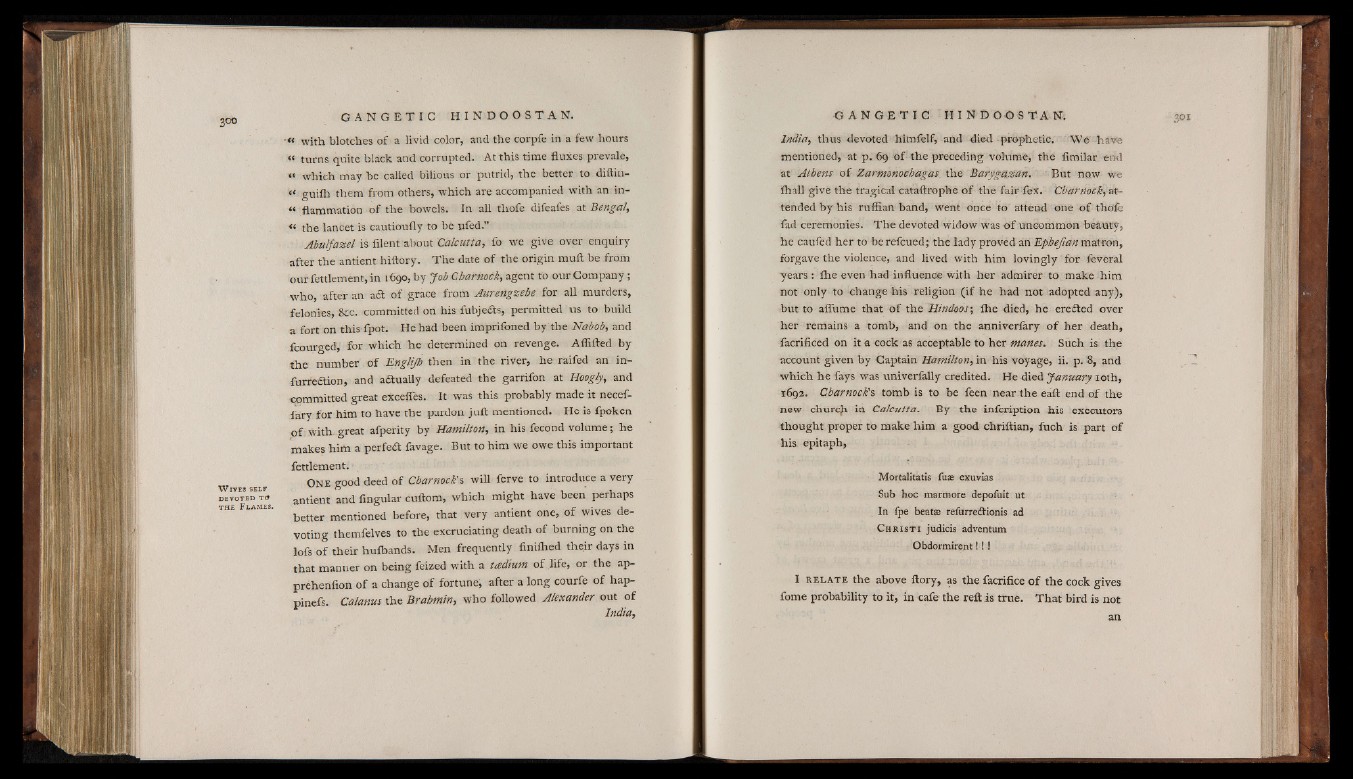
W i v e s s e l f
DEVOTED T<*
t h e F l a m e s .
“ with blotches of a livid color, and the corpfe in a few hours
<< turns quite black and corrupted. At this time fluxes prevale,
tt which may be called bilious or putrid, the better to dilfin-
“ guifh them from others, which are accompanied with an in-
flammation of the bowels. In all tliofe difeafes at lie ngal,
the lancet is cautioufly to be pfed.”
Abulfazel is filent about Calcutta, fo we give over enquiry
after the antient hiftory. The date of the origin mull be from
our feulement, in 1690, by Job Cbarnock, agent to our Company ;
who, after an aft of grace from Aurengzebe for all murders,
felonies, &c. committed on his fubjefts, permitted us to build
a fort on this fpot. He had been imprifoned by the Nabob, and
fcourged, for which he determined on revenge. Afliited by
the number o f Englijh then in the river, he raifed an in-
furfeftion, and aftually defeated the garrifon at Hoogly, and
committed great excelles. It was this probably made it necef-
fary for him to have the pardon juit mentioned. He is fpoken
o f : with, great afperity by Hamilton, in his fécond volume ; he
makes him a perfeft favage. But to him we owe this important
fettlement.
O N E good deed of Cbarnock's will ferve to introduce a very
antient and Angular cuftom, which might have been perhaps
better mentioned before, that very antient one, of wives devoting
themfelves to the excruciating death of burning on the
lofs of their huibands. Men frequently finiihed their days in
rbat manner on being feized with a teedium of .life, or the ap-
prehenflon o f a change o f fortune, after a long courfe of hap-
pinefs. Calanus the Brahmin, who followed Alexander out o f
India,
India, thus devoted himfelf, and died prophetic. We have
mentioned, at p. 69 of the preceding volume, the fimilar end
at Athens of Zarmonochagas_ the Barygttzan. I But now we
lhall give the tragical cataftrophe o f the fair fex. 'Cbarnock,attended
by his ruffian band, went once to attend one o f thole
fad ceremonies. The devoted widow was o f uncommon beauty,
he caufed her to berefcued; the lady proved an Epbejian matron,
forgave the violence, and lived with him lovingly for feveral
years: Ihe even had influence with her admirer to make him
not only to change his religion (if he had not adopted any),
but to aflume that o f the Hindoos', Ihe died, he erefted over
her remains a -tomb, and on the anniverlary o f her death,
facrificed on it a cock as acceptable to her manes. Such is the
account given by Captain Hamilton, in his voyage, ii. p. 8, and
which he fays was univerfally credited. He died January 10th,
1692. Cbarnock's tomb is to be feen near the eait end of the
new churcji in Calcutta. By the infcription his executors
thought proper to make him a good chriftian, fuch is part of
his. epitaph,
Mortalitatis fuse exuvias
Sub hoc marmore depofuit ut
In fpe beatae refurreitionis ad
C h r ist i judicis adventum
Obdormirent!! I
1 r e l a t e the above ftory, as the facriflce o f the cock gives
fome probability to it, in cafe the reft is true. That bird is not